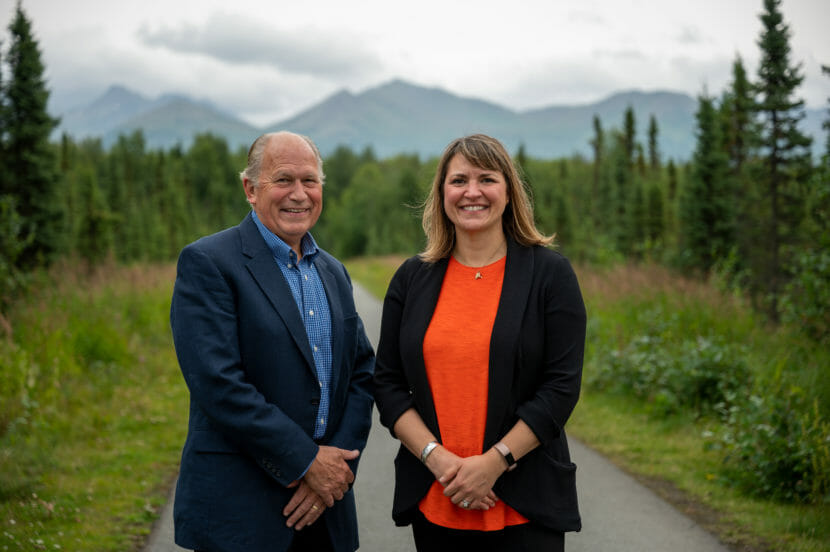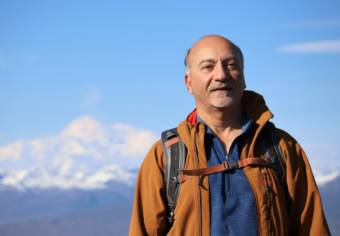
Independent candidate for governor Bill Walker was campaigning in Juneau on Monday. The former governor took questions from Jeremy Hsieh about abortion rights, management of the Alaska Permanent Fund Corporation, and some of the things he says he’ll handle differently than the incumbent if elected.
You can listen to an earlier interview with Democratic candidate Les Gara here.
Listen:
This transcript has been edited for length and clarity.
Jeremy Hsieh: Can you introduce yourself and just say why you’re running?
Bill Walker: I’m running because I think we’re better than what we’ve been doing, and that we spent too much time fighting over what we don’t have and not celebrating and growing the state like what we should be doing. …
One of the reasons I’m running is because of the bipartisan infrastructure bill that’s available for all states to compete for. The current governor doesn’t seem to be very interested in that. In fact, he did not mention it during the State of the State, or any acknowledgement to those in our delegation, such as Sen. Murkowski, that had a big role in that. So that’s an opportunity for Alaska we have never had.
I mean, to me, that funding — which is between 100 and $300 billion, you have to apply for it, you have to compete with all the other states for this money – could be transformational for Alaska. I liken it to the, you know, the Alcan Highway being built or the trans-Alaska oil pipeline during the energy crisis.
Jeremy Hsieh: A question came up about Roe v. Wade, with it being overturned and access to abortion being decided by states. You’ve said you’re pro-life, and (running mate) Ms. Drygas has said she’s pro-choice. But as a campaign, you’ve committed to protecting reproductive rights. How did the two of you come to that position?
Bill Walker: Well, a couple of ways. That’s what the law of the land is. Alaska’s constitution provides that protection on the right to privacy. And so our commitment is to uphold the laws of the Constitution. And we’ll certainly do that. And so nothing would change under our term.
You know, one of the things that we focus on, though, is not just on the laws, but what can we do to minimize the need for abortions? And when I accepted Medicaid expansion, abortion rates went down by 14% in Alaska because 70,000 Alaskans had health care coverage that didn’t otherwise have that. And the state’s budget went down at the same time.
So, there are things we can do. We will certainly introduce legislation for, you know, birth control on a 12-month basis, rather than just for 90 days as it is now. So, we will focus on things to do that would reduce the need for that.
Jeremy Hsieh: Is that difficult for you personally, to support these policy decisions?
Bill Walker: It’s not because, you know, while I am pro-life, I certainly want to reduce the number of abortions. I think everybody wants to do that. So let’s focus on what we can do in that regard. And so nothing will change other than the fact that we will continue to look for ways that, like we have in the past, to reduce the need for that to take place in the first place.
Jeremy Hsieh: Near the end of your first term, you told a reporter that you needed to cut some lumber, maybe build a cabin, as a sort of therapy to get away from the pressures of being governor and to reflect. Did you end up building a cabin?
Bill Walker: Actually, I built a lot more than the cabin. I added on to our house in Anchorage, I added on 1,000 square feet on our commercial building in Valdez. And I did build a cabin. I call it construction therapy. I am a carpenter, my passion. And so I thoroughly enjoyed (that) I didn’t need 21 votes in the House or 11 in the Senate to do what I was doing. And it was very good. I enjoyed it immensely.
Jeremy Hsieh: And did you come out of that process with any kind of, you know, profound conclusions about your first term?
Bill Walker: Well, it was a tough shift. I mean, when you have, you know, $26 (per barrel) oil, and you have a $4 billion hole in the budget, that’s not a pleasant time to be the governor of this great state. But, you know, we made some significant changes in our fiscal situation. And so yeah, it was a challenging time. But it was the greatest honor of my life by far.
Jeremy Hsieh: You brought up fiscal stability. And of course we’re, as a state, relying heavily on the Alaska Permanent Fund Corporation to help us with that stability. And there’s been a shakeup at the Permanent Fund Corporation involving your former attorney general. What are your thoughts on (former CEO) Angela Rodell’s ousting?
Bill Walker: Well, I mean, that’s very unfortunate. I didn’t know her that well initially. I got to know her and liked her very much. And she did a phenomenal job. … And we still don’t have a replacement for Angela Rodell, which is rather shocking, given the importance of the Permanent Fund is to our economy now. …
You know, I would introduce legislation or join others in legislation that would change the method, the process of how you select and put people on that board. It’s too critical of a board for it to be just a straight political appointment. So I would have a process, a vetting process, similar to what we do with judges.
There’s a vetting process we do through the Judicial Council, vet folks and send names on to the governor. So by the time it would get to me — I appointed 27 judges — so by the time they would get to me, I knew that they were qualified, etc, and passed all the different hoops to get there. … Certainly we’ve seen more influence by the governor than ever before.
Jeremy Hsieh: What is your position on the Permanent Fund dividend?
Bill Walker: I want to have the largest dividend that we can possibly have that is sustainable, but not at the expense of weakened government services such as education and public safety. And also, not at the expense of having large taxes just for the dividends. So I want it to be sustainable, I want it to be predictable, I want it to be something that we’re not fighting about every year as far as what the amount is going to be. The formula we have now is 42 years old, that needs to be looked at, and come up with something that is, you know, fair, reasonable, predictable, sustainable and is not jeopardizing dividends for future generations.
Jeremy Hsieh: With oil prices, when you took office end of 2014, price of a barrel oil was about $45 a barrel. Now it’s something like $100. How do you think the state should be reacting?
Bill Walker: Well, you know, when that went down to $26 and we had to close about 40 state facilities, we had to end over 100 programs — laid off I think around several thousand folks, either through attrition or otherwise. I think we need to be careful during high oil prices that we save for the times when it’s not. We can’t act like it’s always going to be there. So we just have to be responsible during the low oil prices, as well as in the high oil prices.
Jeremy Hsieh: A lot of your policy goals require acts of the Legislature, which feels even more fractious than it did when you left office. How do you think you would cut through and accomplish any of your goals?
Bill Walker: Well, I would do what I did last time. I mean, when I didn’t get along with the Legislature, I didn’t run ads against them under the state’s dime, which turned out to be illegal, which — everybody knew that. But I would do what I did before. I’d sit down with him spend time with him.
I mean, (House) Speaker (Mike) Chenault and I did not get along. We were each having press conferences about each other, press statements about each other. And so I joined his bowling team in the legislative bowling league. And he was a little surprised to see me the first night I was there. We became pretty good friends. He’s a great bowler, phenomenal bowler. I’m not. And he’s from Nikiski, where they had a bowling alley, and Kenai. Valdez didn’t have a bowling alley. So we became good friends, now, to this day.
So my style is just to reach out to those I need to work with and find common ground. And you know, I think that’s what Alaskans are looking for. We’re just, you know, solution-focused leadership. We’re doing this to solve problems, solve issues — not focus on another election.
Jeremy Hsieh: Telework options for state workers have expanded a lot during the pandemic, the last few years. Which is nice for some employees. But it’s also concerning for a lot of people in Juneau, kind of worried about capital creep.
Bill Walker: You know, I think there’s a role for that. But if there is, I want to make sure that it’s done in such a way that you still don’t lose that interaction for the public, because sometimes the public needs to come in and interact with somebody actually in a position. And so that doesn’t work the same on the telework concept. So, you know, I’m certainly looking at all options associated with that. But I want to make sure that we have enough presence everywhere that the people actually have someone they can sit down with when they have an issue they need to talk about.
Jeremy Hsieh: Do you have any commitments or promises you can make about where you’ll physically be if you’re elected governor, and where your commissioners and other state employees will be?
Bill Walker: Well, we love living in Juneau, we really did. I’m from Valdez, and yes, Anchorage now. But we love going out fishing and go fishing right over here, you know, in Byron’s boat. And we just enjoyed living in Juneau immensely.
And so, you know, it’s interesting, my running mate now, Heidi Drygas, I asked commissioners to move to Juneau. And she did, as commissioner of labor and workforce development. And met the love of her life, Kevin Sund, and now they have a wonderful home here. They have the love of their life, Olive, is about 4. … I would do the same. This would be home.

